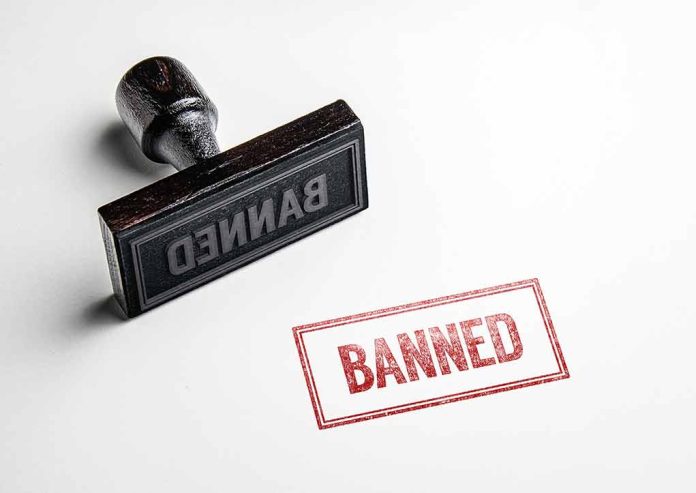
U.S. House bans Chinese-made EV batteries for Homeland Security, citing national security concerns.
At a Glance
- The House passed H.R. 8631, prohibiting DHS from using Gotion’s EV batteries
- Lawmakers cite security risks and concerns over Chinese influence
- The ban aligns with broader efforts to reduce U.S. dependence on Chinese technology
- Gotion’s planned U.S. projects face opposition despite substantial taxpayer subsidies
House Takes Stand Against Chinese EV Batteries
In a significant move to protect national security, the U.S. House of Representatives has unanimously passed legislation banning the Department of Homeland Security (DHS) from using electric vehicle batteries produced by Gotion and other Chinese companies. The Decoupling from Foreign Adversarial Battery Dependence Act, H.R. 8631, reflects growing concerns about the security risks posed by Chinese-made products in critical U.S. infrastructure.
Florida Republican Congressman Carlos Gimenez, a leading sponsor of the bill, emphasized the importance of this decision. “Our government should not be spending tax dollars to procure batteries from companies that profit from slave labor or provide another avenue for the CCP (Chinese Communist Party) to expand their surveillance apparatus here in the United States homeland,” Gimenez stated.
House votes to ban Gotion's EV batteries from Homeland Security https://t.co/3PTdsA5hhQ
— Just the News (@JustTheNews) September 10, 2024
Security Concerns and Economic Implications
The legislation mirrors similar language in the National Defense Authorization Act, which blocked the Department of Defense from procuring batteries from Chinese companies. This coordinated effort across government agencies underscores the seriousness with which U.S. lawmakers view the potential threats posed by Chinese technology in sensitive sectors.
“American tax dollars should never be used to further the Chinese Communist Party’s hopes to dominate key technologies at our expense,” said Michigan Republican U.S. Rep. John Moolenaar in a statement. “That’s why I am proud to co-sponsor the Decoupling from Foreign Adversarial Battery Dependence Act which would stop the Department of Homeland Security from using American taxpayer dollars to purchase Gotion, CATL, or other Chinese batteries. Our military has already banned these batteries and DHS should do the same.”
The ban comes amid ongoing controversy surrounding Gotion’s planned projects in the United States. The company is set to receive over $8 billion in federal and state subsidies for facilities in states like Illinois and Michigan. However, these projects face significant public opposition and legal challenges, highlighting the tension between economic development and national security concerns.
Broader Implications for U.S.-China Relations
This legislative action is part of a larger trend in U.S. policy aimed at reducing dependence on Chinese technology, particularly in areas critical to national security. It reflects growing bipartisan consensus on the need to protect American interests against potential threats from foreign adversaries.
“The West was far too late to recognize the threat of Huawei, TikTok, and PRC-manufactured cranes installed at America’s seaports. We know that doing business in China means enriching the CCP––and that comes at a steep cost, even if there are perceived short-term benefits,” Gimenez said. “America must be proactive in addressing the threats posed by the CCP to our technology, information, and way of life. The Department of Defense has rightfully ended the use of these PRC-manufactured batteries, and it is past time for DHS to follow suit.”
While the ban has received strong support, some lawmakers have expressed concerns about its potential impact on the U.S. electric vehicle industry. Maryland Democratic Congressman Glenn Ivey noted, “While these amendments have made the bill better, there are lingering concerns, including how a ban on Chinese-made batteries will impact DHS’ ability to buy American-made electric vehicles, since most American EV producers used Chinese-sourced batteries.”
As the U.S. continues to navigate the complex landscape of global technology and security, this decision marks a clear stance on prioritizing national security over short-term economic gains. The implications of this ban will likely reverberate beyond the halls of government, affecting industry dynamics and potentially reshaping the future of electric vehicle production in America.
Sources:
- U.S. House takes stand against CCP Gotion — bans DHS from ‘foreign adversarial battery dependence’
- House votes to ban Gotion’s EV batteries from Homeland Security
- House votes to ban Gotion’s EV batteries from Homeland Security – Center Square
- House votes to ban Gotion’s EV batteries from Homeland Security
- Philadelphia buzzing ahead of presidential debate
- Democratic support for Gotion cracking under public pressure as U.S. House votes unanimously to bar DHS use of its batteries – Wirepoints






